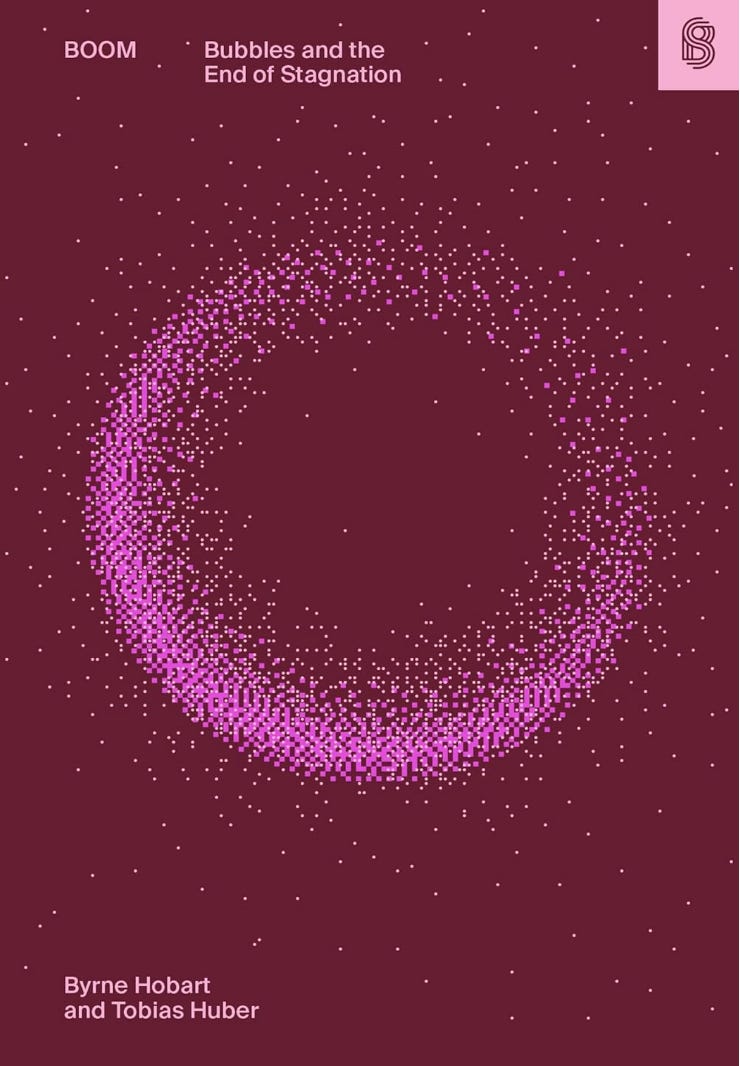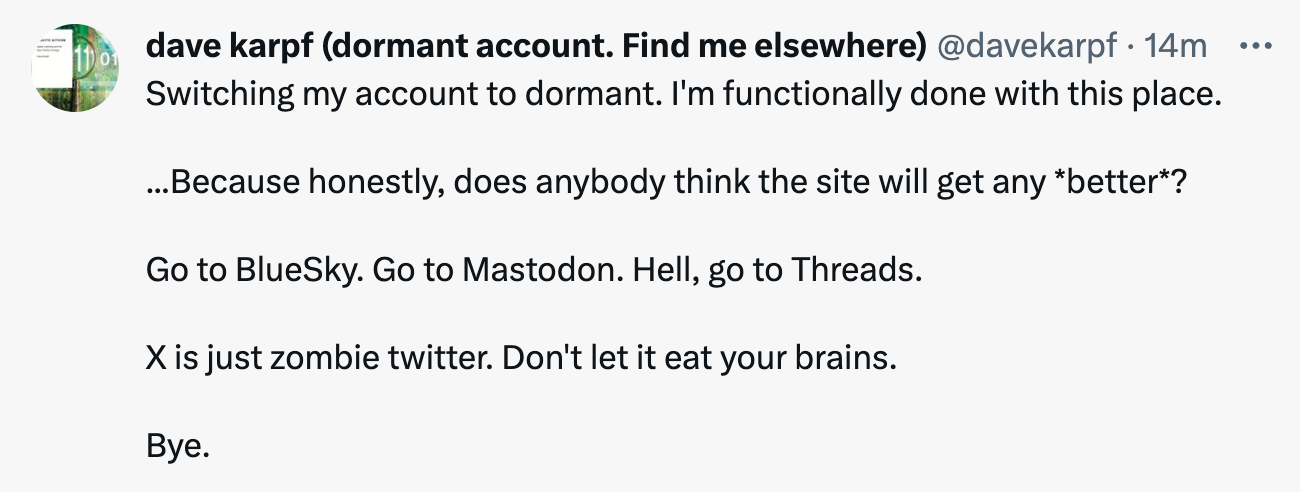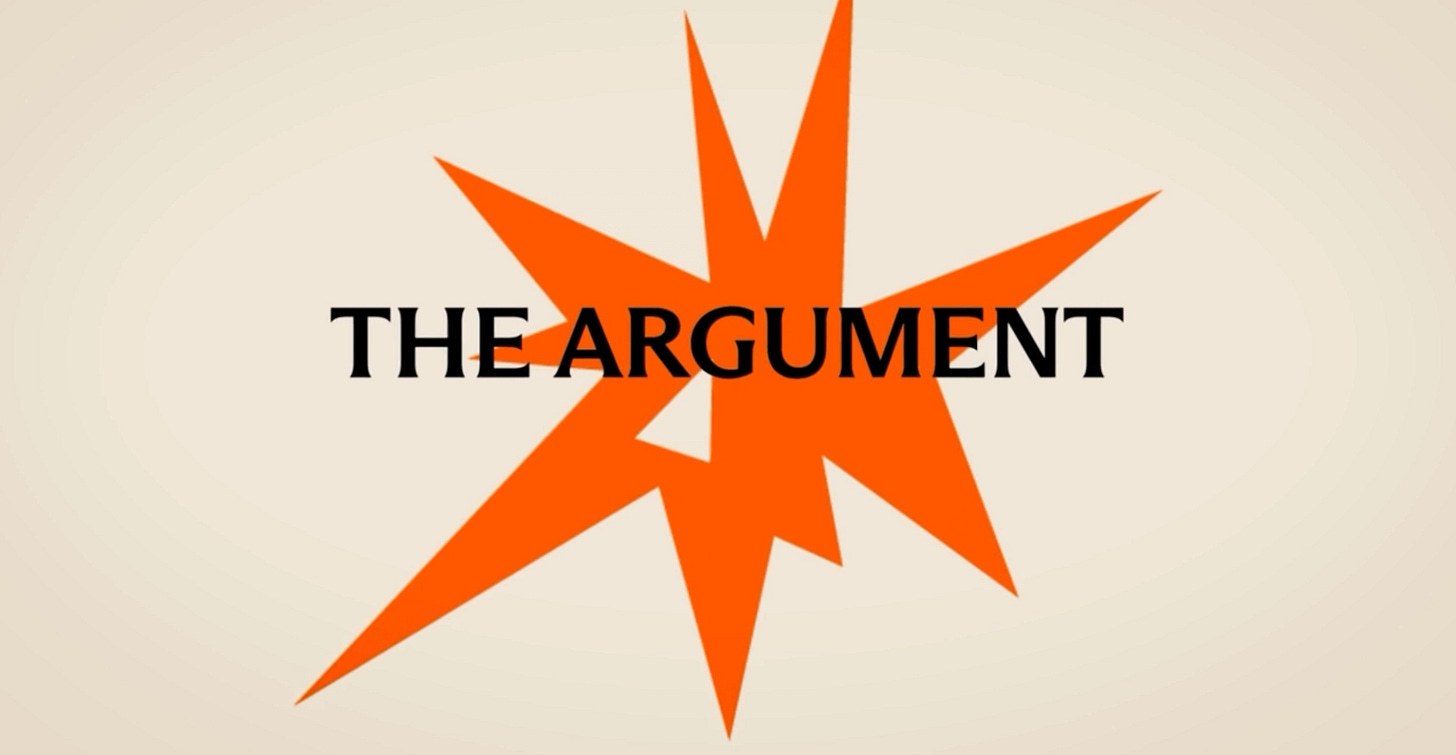Bullet Points: Arguments about Arguments edition
(I sprained my ankle yesterday. Today’s post is 20% crankier than usual.)
(1) I wrote another unhinged book review thread on Bluesky.
This time, the book was Boom: Bubbles and the End of Stagnation, by Byrne Hobart and Tobias Huber.
The book’s main thesis is that (1) investment bubbles are good, (2) we should have more of them, and (3) we risk apocalyptic society-wide stagnation if we don’t get them. Hobart and Huber think that the rise of “safetyism” and a growing aversion to risk (across government, finance, and the broader culture at large) is why the pace of scientific and technological progress started to decline after the 1970s.
If you’re wondering how they support this claim, the basic answer is “badly.” They cherry-pick six case studies of successful innovations and show that all of them enjoyed bold visions, ample funding, and room to fail. They make two elementary mistakes with this approach, though.
First, methodologically, if you try to derive the “secret formula” by only studying iconic successes, then you’re doing social science wrong. That’s called selecting on the dependent variable. You have to also examine failures if you want to identify what sets the successes apart.
Second, they take a comically sloppy approach to defining their terms. They dismiss the Great Financial Crisis out of hand as the wrong kind of bubble. The Manhattan Project and the Apollo space program, however, are bubbles — just like Bitcoin, in fact.
The thing they’ve managed to erase is the distinction between government money and dumb money. Apollo and the Manhattan Project were funded by government dollars. So were the Human Genome Project and the Inflation Reduction Act. The political economy of those projects is centered around experts convincing elites of a promising new potential future, and on not-fucking-it-all-up. the political economy of speculative bubbles centers around hucksters convincing marks that we’ll all get rich, and keeping elite institutions at bay. It’s true that speculative bubbles can also leave behind valuable byproducts, but the commonalities pretty much end there.
Fundamentally, the book’s thesis just doesn’t pass the sniff test. 21st-century finance has far more appetite for risk than it did in the 1950s or 1970s. Read Other People’s Money. Read The Phoenix Economy. If you really think that mass culture today is more risk-averse than it was 30 years ago, let me invite you to watch the ads during a sporting event. It’s all DraftKings all the time now. One might, like Nate Silver, argue that this society-wide appetite for gambling is good (it isn’t).
How exactly are we less risk-tolerant in an era of financial derivatives and gambling-on-everything than we were in the 1950s? The simple answer is that we aren’t. This is all made up. The authors love their bitcoin, so they want everyone to know that bitcoin is just like the Manhattan Project and we ought to have more of it.
The part that really struck me was that the authors never spare a thought for who bears the brunt of all this risk. Risk and volatility are great, but also meaningless, if you are a wealth early investor who can take limitless shots with limitless upside. (The image of Elon Musk at the poker table springs to mind.) If you have enough capital, then even financial crashes present a great opportunity to scoop up distressed assets.
It is easy to say, decades later, that the dotcom bubble was good because it left us with a glut of cheap broadband after the crash. But a lot of people went bankrupt when Global Crossing and Worldcom collapsed. That’s, y’know, really quite bad. The Apollo space program didn’t crush the lives of retail investors.
Everyone loves telling stories about the risk-takers whose bold bets panned out. But should Elon Musk get to take self-driving car risks with other people’s lives? Should Sam Bankman-Fried get to take crypto banking risks with his investors’ deposits? This is pretty elementary stuff, and Hobart and Huber just pretend it away.
Boom is mostly interesting as a sociological artifact. Hobart and Huber are VCs and angel investors. Their book was published by Stripe Press, a vanity press operated by the owners of the Stripe payment platform. They love Peter Thiel, so they invoke him like college-aged socialists quoting Karl Marx. They read Rene Girard, because that’s who Thiel tells you to read. They talk about the cultural stagnation and decline of “the west,” and never even gesture toward unpacking that baggage.
Books like this provide a window into the overconfident absurdities that Silicon Valley’s libertarian investor-class utter when trying to impress each other.
(2) Are there any opportunities for progressive federal policy reform right now? (Probably not)
About a month ago, Ezra Klein brought Jesse Jenkins and Jane Flegal on his podcast to discuss “Is Decarbonization Dead?” I generally have a lot of respect for Jenkins and Flegal, and the podcast is worth listening to.
One point that came up was permitting reform. Jenkins and Flegal made the case that the climate movement ought to seek a deal that makes it much easier to build all sorts of new energy project — wind, solar, nuclear, coal, fracking, oil, you name it.
Flegal: …the thing is, if you look at all current energy projects in the U.S. that have completed environmental impact statements under NEPA over the last decade, clean energy dominates fossil projects. It would almost undoubtedly advantage clean energy over fossil.
Jenkins: Just in the power sector, 95 percent of the new capacity we’re adding to the grid right now and over the next couple years is wind, solar and batteries. Ninety-five percent. Just making it easier to build will structurally advantage building clean energy because that’s mostly what we want to build.
It’s an interesting, counterintuitive argument. The legacy environmental movement is historically much better at stopping bad development than it is at speeding up good development. (Though there are interesting exceptions to this overarching story… and someday I really am going to finish writing that piece about the ‘90s “smart growth” movement as a precursor to today’s YIMBYism.) Clean energy projects are now much more cost-effective than fossil fuel initiatives. On a level playing field, that all seems promising.
But the thing is… we aren’t operating on a level playing field at all. We’re operating in a hostile environment, where any project that Donald Trump notices and dislikes gets leveled.
Here’s a headline from this Friday’s New York Times: “Trump Administration Orders Work Halted on Wind Farm That Is Nearly Built.”
The Trump administration on Friday ordered that all construction stop on Revolution Wind, a $4 billion wind farm off the coast of Rhode Island that is already mostly built.
The 65-turbine project had obtained all necessary permits from the Biden administration, and nearly 70 percent of the turbines have been installed. The developers behind the project had said it was on track to produce enough electricity for more than 350,000 homes in Rhode Island and Connecticut by next spring.
Matthew Giacona, the acting director of the Bureau of Ocean Energy Management, issued a letter on Friday to Orsted, the Danish company building the wind farm, ordering it to “halt all ongoing activities” because of unspecified issues.
“In particular, BOEM is seeking to address concerns related to the protection of national security interests in the United States,” Mr. Giacona wrote, adding that Orsted “may not resume activities” until the agency has completed a review of the project.
This is why I can’t get behind the idea of some permitting reform “grand bargain” right now. I can see why the policy wonks like it. I can understand, in normal times, why it would be appealing. The climate crisis is a ticking clock. We should not and cannot simply waste these years. But these are not normal times. Pursuing permitting reform right now is akin to forming partnerships with RFK Jr in the hopes that “Make American Healthy Again” can be talked into pursuing sound science. Those simply aren’t the times we are living through right now.
(3) The Argument gets off to a rocky start.
I was going to abstain from the pile-on against Jerusalem Demsas’s “Case for Staying on Twitter.” This was an interesting debate two years ago. And, indeed, I said pretty much all I had to say on the topic in a September 2023 post.
Does anyone think Twitter gets *better* from here?
Micah Sifry poses the question in his latest post: “Is it finally time to quit Twitter?” He evaluates the pros and cons and finds them approximately balanced.
But then I sprained my ankle yesterday, leaving me very cranky and unoccupied. So I went on a little bluesky rant. The TL;DR version is that the timing of Demsas’s essay says a lot about what sort of publication she intends her new Substack-outlet, The Argument, to be.
Strategically, you write a piece like this in August 2025 to signal what sort of liberal you are. You write it to announce, “I’m not like those scolds who left for Bluesky. I courageously stick it out and encounter people I disagree with in that great public square, Twitter/X!”
Here’s the weakest part of her argument is:
Twitter is — without question — the most influential public square we have. At one point, in 2021, a Pew Research poll indicated that Twitter served nearly one in four Americans. By 2024, two years after Musk had bought the platform, 21% of people reported using it.
More anecdotally, no other venue sees elected officials mingling with academics, Fortune 500 CEOs, and celebrities. In Washington, Twitter is still one of the best places for a young think tanker or journalist to gain attention for their work. The posting-to-policy pipeline is alive and well — just look at Stephen Smith’s one-man, years-long crusade to make single-stair apartments a reality. I’ve also found sources and new voices on the website and have had new perspectives surfaced that I would not otherwise have encountered.
Twitter circa 2021 was arguably the most influential public square we had. X in 2025 is, by some recent estimates, 75% bots.
I left the platform two years ago for pragmatic reasons. I had 42,000 followers, and my posts were getting ~2,000 views. It was still possible to go viral on the platform, but only if you contorted yourself into feeding the algorithm a very specific type of outrage. And it has only gone further downhill ever since.
There are still some communities holding fast there. I don’t fault them for it. But let’s not pretend it’s flourishing. Just because Bluesky doesn’t match peak-Twitter doesn’t mean X is anything like its glory days.
The argument for staying on Twitter is that you can find CEOs and elected officials still hobnobbing there. If you are the type of person who enjoys interacting with Bill Ackman and Marc Andreessen, then that can be quite a rush. But the price of admission is that you need to avoid saying anything that gets you blocked by them.
That is a CHOICE. You can engage in arguments with people you disagree with. But only the right arguments, and only in the right tones. X is Elon’s propaganda outlet. It is failing and flailing. It is, at this point, worthless for people like me.
Demsas’s publication is only a week old. There are some writers on the masthead who I quite like, and others who I do not care for. It’s a well-funded publication, so I’d like to see it do some good.
But if this is an example of the contribution they hope to make, then I imagine this won’t be the last time I poke fun at them.





You mentioned (rightly so) that this is not a time to strike a grand bargain on energy infrastructure…_in the US_. But what about other countries. In Canada, we now have a conservative (small “c”) Liberal (big “L”) prime minister who is trying to do exactly that. He’s trying to make it easier to create energy projects in general.
Still deeply concerned that this is going to go sideways, but for now at least I think that Mark Carney is acting in good faith.
I pay for way more Substacks than I have time to read, but this one pushed yours to the top of the "next!" list. I've reviewed many, many books in my day, the good, the bad, and the terrible. Yours make me laugh and it made me think. Great combination. Thank you.